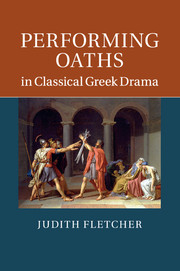Book contents
- Frontmatter
- Contents
- Acknowledgments
- A note on abbreviations
- Introduction
- Chapter 1 From curses to blessings: horkos in the Oresteia
- Chapter 2 Speaking like a man: oaths in Sophocles’ Trachiniae and Philoctetes
- Chapter 3 Horkos in the polis: Athens, Thebes and Sophocles
- Chapter 4 Perjury and other perversions: Euripides’ Phoenissae, Orestes and Cyclops
- Chapter 5 Twisted justice in Aristophanes’ Clouds
- Chapter 6 Women and oaths in Euripides
- Chapter 7 How to do things with Euripides: Aristophanes’ Thesmophoriazusae
- Chapter 8 Swearing off sex: the women's oath in Aristophanes’ Lysistrata
- Conclusion
- Bibliography
- Index locorum
- General index
Chapter 2 - Speaking like a man: oaths in Sophocles’ Trachiniae and Philoctetes
Published online by Cambridge University Press: 05 December 2011
- Frontmatter
- Contents
- Acknowledgments
- A note on abbreviations
- Introduction
- Chapter 1 From curses to blessings: horkos in the Oresteia
- Chapter 2 Speaking like a man: oaths in Sophocles’ Trachiniae and Philoctetes
- Chapter 3 Horkos in the polis: Athens, Thebes and Sophocles
- Chapter 4 Perjury and other perversions: Euripides’ Phoenissae, Orestes and Cyclops
- Chapter 5 Twisted justice in Aristophanes’ Clouds
- Chapter 6 Women and oaths in Euripides
- Chapter 7 How to do things with Euripides: Aristophanes’ Thesmophoriazusae
- Chapter 8 Swearing off sex: the women's oath in Aristophanes’ Lysistrata
- Conclusion
- Bibliography
- Index locorum
- General index
Summary
J. L. Austin, as Jacques Derrida observed, was fundamentally concerned with law and convention in his formulation of speech act theory. The different gradations of performative language were explored by Austin's disciple, John Searle, who made a distinction between illocutions that are ratified by communal protocols (such as laws) and individual speech acts such as promises, threats and insults, that are established and understood by social convention but do not invoke institutional authorization. In the previous chapter I argued that Aeschylus constructs Athens as the place where the most effective performative language becomes an instrument of civic and interstate law. If we take Searle's distinction into account, we can say that in the Oresteia the oath has moved from the category of the non-institutional speech act (oaths of vengeance) to the institutional (the dikastic and treaty oaths). Orestes’ performance of the Argive alliance is a significant transformational event: he has secured his identity as an adult male who can effectively use contractual language in a political context. To borrow the words of Richard Ohmann, he participates in discourse, which is “to set in motion one's whole awareness of institutions, social ties, obligations, responsibilities, manners, rituals, ceremonies.” The treaty that he offers to Athens enmeshes him in a community created by such speech acts, and that accords some of its participants the right to generate the performative language of law. “Illocutionary acts,” as Ohmann also says, “have the power to change a friendship or a society, to alter the institutional structure out of which they rise.”
The two Sophoclean texts treated in this chapter also conclude with young men swearing oaths that are in some way transformative. These differ from Orestes’ treaty oath, however, because they are not the speech acts of interstate politics, but rather individual promises made man to man. Although Hyllus and Neoptolemus swear oaths that are procedurally correct, they do not make their promises in public as Orestes does, but in private moments. The youths are not yet part of any political collective, and thus do not articulate what Searle would call an institutional speech act. Nonetheless Hyllus and Neoptolemus, by using the contractual language of the oath, signify that their discourse has the potential to contribute to shaping their respective societies. In both plays young men learn how to do things with words, and by doing so they signify a new identity as an adult male.
- Type
- Chapter
- Information
- Performing Oaths in Classical Greek Drama , pp. 70 - 101Publisher: Cambridge University PressPrint publication year: 2011



